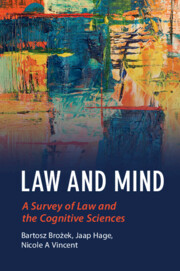
- Cited by 4
-
Cited byCrossref Citations
This Book has been cited by the following publications. This list is generated based on data provided by Crossref.
2022.
Brożek, Bartosz 2023. Ciencia cognitiva y naturaleza del derecho. Revus,
Brożek, Bartosz Furman, Michał Jakubiec, Marek and Kucharzyk, Bartłomiej 2024. The black box problem revisited. Real and imaginary challenges for automated legal decision making. Artificial Intelligence and Law, Vol. 32, Issue. 2, p. 427.
Shelke, Atmaram Arya, Sujata Prasad, Sachchidanand and Sharma, Padmakshi 2025. To patent or not to patent: dissecting moral disharmony in the context of human embryonic stem cell patenting. Cogent Social Sciences, Vol. 11, Issue. 1,
- Publisher:
- Cambridge University Press
- Online publication date:
- April 2021
- Print publication year:
- 2021
- Online ISBN:
- 9781108623056
- Series:
- Law and the Cognitive Sciences
- Subjects:
- Law, Law and technology, science, communication, Psychology, Cognition


